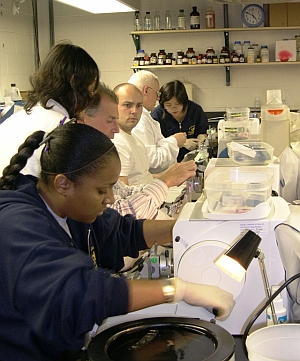New Master’s Program Targets Profession in High Demand
May 19, 2009

With the U.S. economy in a recession, we hear every day about layoffs and the struggling job market. But there’s one industry you may never have heard of where high-paying jobs are available and qualified candidates are in demand. It’s called histotechnology, and Drexel University College of Medicine has become the first school in the nation to offer a master’s degree in this exciting field.
“There is a national shortage of histotechnologists right now, due in large part to the aging population of people currently working in the field,” said Chris Mignogna, director of the new Drexel University College of Medicine Master of Science in Histotechnology program.
“That shortage is exacerbated as the volume of laboratory tests increases with population growth and advancements in medical technology. Histotechnologists are now needed for more than routine tissue processing cutting and staining. They are employed in molecular, image analysis, cytogenetic, tissue banking and research laboratories.”
The histotechnology master’s program at Drexel University College of Medicine is currently accepting applications for August enrollment. It is a one-year, full-time course of study comprising classroom and laboratory training, with a three-month practicum. The program is ideal for recent college graduates with a bachelor’s degree in biology or a related field, or for allied health professionals currently working in a lab and seeking an advanced degree.
“A master’s-level education allows higher entry level into the profession or the chance for promotion in an existing position,” said Mignogna. “Also, with the additional hands-on training in advanced techniques like in situ hybridization (IHC), and image analysis, graduates of our program will be better prepared to fill the future needs of histotechnology.”
Learn more about the Histotechnology master's program.